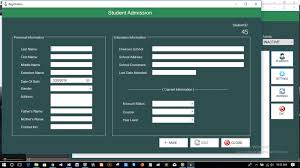
The Importance of a Student File Management System
As students navigate through their academic journey, they accumulate a vast amount of digital files, including assignments, research papers, lecture notes, and more. Keeping track of these files can quickly become overwhelming without an efficient file management system in place.
A student file management system is a crucial tool that helps students organize, store, and access their academic files with ease. By implementing such a system, students can streamline their workflow, save time searching for specific documents, and ensure that their files are secure and backed up.
One of the key benefits of a student file management system is the ability to categorize files based on subjects, semesters, or projects. This organizational structure allows students to quickly locate the information they need without sifting through numerous folders or documents.
Furthermore, a file management system enhances collaboration among students by enabling easy sharing and collaboration on group projects. Students can securely share files with classmates or instructors, receive feedback in real-time, and work together seamlessly regardless of their physical location.
Security is another critical aspect of a student file management system. By utilizing secure cloud storage or local backups, students can protect their valuable academic work from data loss or unauthorized access. This ensures that important files are safeguarded against unforeseen events like hardware failures or accidental deletions.
In conclusion, a student file management system is an essential tool for modern-day learners to stay organized, efficient, and productive throughout their academic endeavors. By leveraging the benefits of such a system, students can focus on learning and achieving their academic goals without the distractions caused by disorganized digital clutter.
7 Essential Tips for Effective Student File Management: Organization, Backup, and Access Control Strategies
- Organize files into folders by subject or course
- Use clear and consistent file naming conventions
- Backup important files regularly to prevent data loss
- Keep track of deadlines and organize files accordingly
- Utilize cloud storage for easy access from any device
- Regularly declutter and delete unnecessary files to free up space
- Set permissions on sensitive documents to control access
Organize files into folders by subject or course
Organizing files into folders by subject or course is a practical tip that can significantly enhance a student’s file management system. By categorizing files based on specific subjects or courses, students can easily locate relevant materials when studying, completing assignments, or preparing for exams. This structured approach not only saves time that would otherwise be spent searching for documents but also promotes a more efficient and systematic workflow. Additionally, organizing files by subject allows students to maintain a clear overview of their academic materials and ensures that important information is readily accessible whenever needed.
Use clear and consistent file naming conventions
When it comes to optimizing a student file management system, employing clear and consistent file naming conventions is paramount. By adopting a standardized approach to naming files, students can easily identify and retrieve specific documents without confusion or wasted time. Consistent file naming not only enhances organization but also facilitates efficient searching and sorting of files, ultimately streamlining the entire academic workflow.
Backup important files regularly to prevent data loss
Regularly backing up important files is a crucial aspect of effective student file management systems. By creating backups of essential academic documents, students can safeguard their work against potential data loss due to unforeseen events such as hardware failures, accidental deletions, or computer viruses. Implementing a routine backup strategy ensures that valuable files are securely stored and easily recoverable in case of emergencies, allowing students to focus on their studies with peace of mind knowing that their work is protected.
Keep track of deadlines and organize files accordingly
Keeping track of deadlines and organizing files accordingly is a crucial tip for effective student file management. By maintaining a clear understanding of assignment due dates, project deadlines, and exam schedules, students can prioritize their tasks and ensure timely submission of work. Organizing files based on deadlines helps students easily locate and access the necessary materials, reducing last-minute stress and improving overall productivity. This proactive approach not only enhances time management skills but also fosters a sense of control and preparedness in the academic environment.
Utilize cloud storage for easy access from any device
Utilizing cloud storage for your student file management system offers the convenience of accessing your files from any device with an internet connection. Whether you’re working on a project from your laptop, tablet, or smartphone, cloud storage ensures that your files are always within reach. This flexibility not only enhances collaboration and productivity but also provides peace of mind knowing that your important academic documents are securely stored and easily accessible whenever you need them.
Regularly declutter and delete unnecessary files to free up space
Regularly decluttering and deleting unnecessary files is a crucial tip for maintaining an efficient student file management system. By periodically reviewing and removing files that are no longer needed, students can free up valuable storage space, improve system performance, and ensure that their important documents are easily accessible. This practice not only helps in organizing files effectively but also contributes to a more streamlined and productive academic workflow.
Set permissions on sensitive documents to control access
Setting permissions on sensitive documents is a crucial aspect of effective student file management systems. By controlling access to confidential or private information, students can ensure that only authorized individuals can view or edit specific documents. This security measure not only protects sensitive data from unauthorized access but also helps maintain the integrity and confidentiality of academic work. Whether collaborating on group projects or storing personal research, setting permissions adds an extra layer of protection to student files, giving peace of mind and fostering a secure digital environment for academic success.
